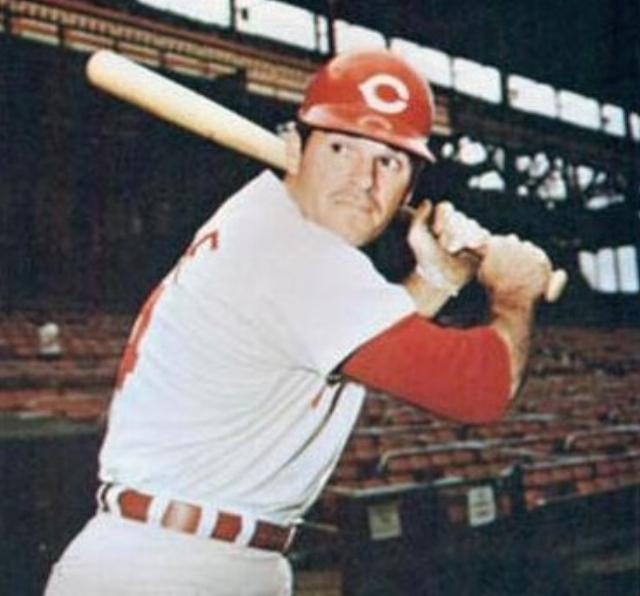Pete Rose, an extraordinary player and a damaged human being
Last week, Pete Rose. He was 83. The man once called “Charlie Hustle,” a nickname acquired for his non-stop energy and enthusiasm, was the piston that ignited “The Big Red Machine” in the 1970s, is no more. Rose was also perhaps the most controversial player in the game of baseball because his off-the-field “exploits” smothered what he did for the game of baseball.
Rose embraced the Charlie Hustle nickname and probably used it as another motivating tool both to make it onto the Cincinnati Reds, his boyhood and hometown team, but also to inspire him to the level of play that put him on a tier with the superstars of the game.
Although Rose was not the greatest player of his generation and never even the best on any of the teams on which he played, he nevertheless managed to be an extraordinary player, racking up a huge number of records (MLB’s all-time leader in hits, games played, at-bates, singles, and outs, as well as winning three World Series championships, along with a slew of awards.) Of the field, Rose was as large as he was on the field, and that was a shame, because he managed to destroy himself.

Image: 1972 Pete Rose trading card (cropped). Public domain.
His story is more than a hero being mortal and fallible. Instead, his personal tragedy became an American tragedy by destroying the faith that so many people—both children and adults—had in the man after watching him play with such joyful abandon. He forever tainted childhood dreams and adult respect.
Once, heroes were people who guided us. Harry Truman’s most cherished book when he was a child was a history of great men, from the Roman era forward, telling him how to live a good, useful, courageous, and even important life. Rose could have been one of those great men but he will be remembered as, at best, a disappointment.
Rose was a gritty, blue-collar player, a hometown kid who made it to the big leagues and stayed there by proving day in and day out that he could play with baseball titans. He was right up there with the “Willie Mays, Roberto Clementes, Frank Robinsons, and Hank Aarons of baseball. His sheer grit saw him selected or voted to 17 All-Star Games, as well as those three World Series titles, and an MVP.
What made him so admirable was his indefatigably optimistic attitude. He was always honing his skills both physically and mentally. Even though he didn’t have blazing speed, a “gold” glove, a rifle arm, or herculean power, he was able to meld his baseball talent with his baseball IQ and acumen—these two latter traits arguably being the highest among any baseball player ever. He represented the common man ignoring the odds against him and achieving greatness.
Because of Rose’s grit, determination, spirit, and enthusiasm for the game watching and rooting for him was easy, fun, and rewarding. You knew rooting for Rose meant your team had a chance to win the game every time. He was regarded as a great team player, sacrificing himself to improve the club.
He was a winner.
However, because he was ego-driven, self-promoting, and narcissistic, for those who weren’t Cincinnati Reds fans, he made it really easy to root for any team opposing the Reds. But regardless of one’s team preferences, Rose’s work ethic and performances on the field earned one’s respect.
But Rose’s vices destroyed it all. His insatiable gambling habit, which included betting on games while he was managing a team, divorced him from MLB. He never came to grips with his addiction. His fans were devastated, disappointed, and brokenhearted that an athlete who gave his all on the diamond with boyish delight and spirit could be so deeply involved in gambling.
How could he betray them and the game he loved? How could he place gambling over the American Dream that he symbolized? His commitment to vice was unbelievably tragic and will forever be a black mark on The American Pastime.
And perhaps the biggest tragedy of all is that he never could grasp what he did wrong. “My actions, which I thought were benign, called the integrity of the game into question,” Rose wrote. “And there’s no excuse for that, but there’s also no reason to punish me forever.”
Forgiving fans have empathy for Pete Rose’s fall from grace but realize that, in the end, Charlie hustled us.
FOLLOW US ON
Recent Articles
- New York Greenlights Quarantine Camps
- Reality Check for Democrats
- A MAGA Siege of the Democrats’ Deep State
- Why Incel and 4B Culture Matter
- Defending Donald Trump: A Response to Jeffrey Goldberg and The Atlantic on the Signal Leak
- Are Judges Complicit in Lawfare?
- Deep Dive: The Signal Chat Leak
- Mark Steyn’s Reversal of Fortune
- Where We Need Musk’s Chainsaw the Most
- Trump Is Not Destroying the Constitution, but Restoring It
Blog Posts
- Nasty Venezuelan migrant who flashed taxpayer dollars and urged squatting, gets thrown out
- In Pennsylvania, are Democrats stealing votes again?
- Knife control comes to the U.K.: Prime Minister Starmer bans Ninja swords
- This Tuesday, Wisconsonites must vote for Brad Schimel for the State Supreme Court
- Was Vietnam worth the cost?
- Democrats should get a clue from the Palestinians who are now marching against Hamas
- Trump takes on Fauxahontas's brainchild
- Consumer Sentiment Survey: This too shall pass
- If they only had knife control....
- Newsom and Walz struggle to appear normal
- Anti-Trump lawfare: yes, it's a conspiracy
- Criminal attack? You're on your own.
- Amid disaster, watch Bangkok clean up and rebuild
- Katherine Maher shoots herself, and NPR, in the foot
- A visit to DOGE






